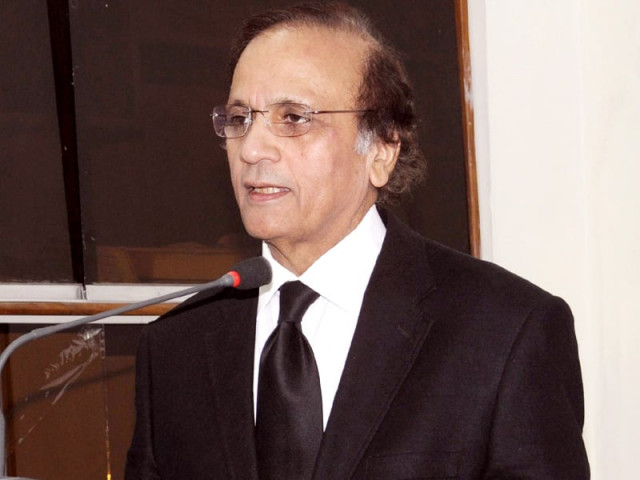Ex-CJP to be Pakistan’s ad-hoc judge for Jadhav case
Govt will convey its decision on Tassaduq Hussain Jillani’s nomination to ICJ this month

Tassaduq Hussain Jillani. PHOTO: FILE
Justice Jillani, also known as 'the Gentleman Judge' for his mild demeanor, was nominated to the Lahore High Court bench by former prime minister Benazir Bhutto in 1990s. He authored the Supreme Court’s judicial anthem and was also among those SC judges who had refused to take oath under the PCO on November 3, 2007, when the then General (retd) Pervez Musharraf had imposed an emergency. As CJP, his decisions on the rights of religious minorities were compared to the outlawing of racial segregation in the United States.
Sources informed The Express Tribune that the government made the call to appoint the former chief justice after consultations with all stakeholders, including the military.
“A summary has already been sent to the Prime Minister’s Office by the law department, wherein the names of Justice Tassaduq Hussain Jilani and senior lawyer Makhdoom Ali Khan were proposed. The government decided to appoint former CJ Jillani,” one source said.
Jillani retired as chief justice of Pakistan on July 5, 2014. He was the successor to Iftikhar Muhammad Chaudhry, who retired on December 11, 2013.
Pakistan to appoint ad hoc judge at ICJ
Sources say a senior lawyer, who has been associated with the Sharif family’s legal team, played a key role in Justice Jilani’s appointment. Jillani is also a cousin of former foreign secretary Jalil Abbas Jilani.
On the other hand, Pakistan Bar Council (PBC) representative Raheel Kamran Sheikh has called upon the government to seek parliament’s approval on the appointment of an ad-hoc judge.
Sources say the federal government will convey its decision on the nomination of the ad-hoc judge to the ICJ this month.
Only one person has previously been appointed as an ICJ judge in Pakistan’s history – former foreign minister Zafarullah Khan, in 1954, who later became the president of the court. Justice Yaqub Ali Khan and Sharifuddin Pirzada both served as ad-hoc judges, as did Zafarullah. Likewise, Justice (retd) Ali Nawaz Chohan worked as an ICJ judge.
ICJ stays Jadhav’s hanging till it makes final ruling
Meanwhile, a high-level meeting was held at the AGP’s office on Friday to mull a future strategy regarding the Jadhav case. Attendees included representatives of various departments. On September 13, India submitted its 22 pages memorial to the ICJ.
Earlier, a senior official said Pakistan had requested that the matter of filing of written replies ought to be completed before the end of the year, adding that Pakistan is expected to give its memorial in December.
The ICJ on May 18 halted the execution of Jadhav. The hearing of the case is expected to be fixed at the start of next year or end of this year. Jadhav was sentenced to death by a military court in Pakistan on April 10 after being convicted on charges of terrorism and espionage.
Sources revealed that Pakistan in its pleadings will be filing a dossier on various human rights violations committed by India in the past to highlight its lack of respect for human rights.
“It will also be providing evidence of terror financing network which was penetrated and broken because of information and confession made by Commander Kulbhushan,” they further informed. During the meeting, the AG also informed the ICJ about Pakistan’s intent to appoint an ad-hoc judge to sit on the bench for all proceedings in this case, including the substantive hearing.
'Pakistan cannot go to ICJ over Kashmir'
A senior lawyer, who has expertise in international law, contended that India can never obtain an acquittal or the release of Jadhav on the basis of its application.
Commander Jhadev alias Hussain Mubarak Patel, a serving Indian Navy officer working with Research and Analysis Wing (RAW) – India’s premier intelligence agency – was apprehended on March 3, 2016, after he illegally crossed over into Pakistan from the Pakistan-Iran border.
He was found in possession of an Indian passport issued by the Government of India on May 12, 2015, and valid until May 11, 2024. He confessed that he is a resident of Mumbai, India, still serving in the navy, and is scheduled to retire in 2022. The videos of his confession circulated widely in the media. He was convicted of espionage, sabotage, and terrorism by a field general court martial (FGCM) under Section 59 of the Pakistan Army Act (PAA) 1952 and Section 3 of the Official Secrets Act of 1923.
He confessed before a magistrate and the court that he was tasked by RAW to plan, coordinate and organise espionage and sabotage activities aimed at destabilising Pakistan.
Among the charges, he was convicted for were sponsoring and directing IEDs and grenade attacks in Gwadar and Turbat. He also directed attacks on the radar station and civilian boats in the sea, opposite Jiwani Port. He funded subversive secessionist and terrorist elements through hundi for turning Pakistani youth against the country, especially in Balochistan. He sponsored attacks on gas pipelines and other infrastructure, an IED explosion in Quetta in 2015, causing massive damage to life and property, and attacks on Hazaras in Quetta and Shia Zaireen en route to and from Iran.
He abetted attacks through anti-state elements against LEAs/FC and FWO in areas of Turbat, Punjgur, Gwadar, Pasni and Jiwani during 2014-2015, killing and injuring many civilians and soldiers. He launched a website with subversive content in support of anti-Pakistan elements. Pakistan repeatedly requested India for assistance in the investigation but to no avail.



















COMMENTS
Comments are moderated and generally will be posted if they are on-topic and not abusive.
For more information, please see our Comments FAQ